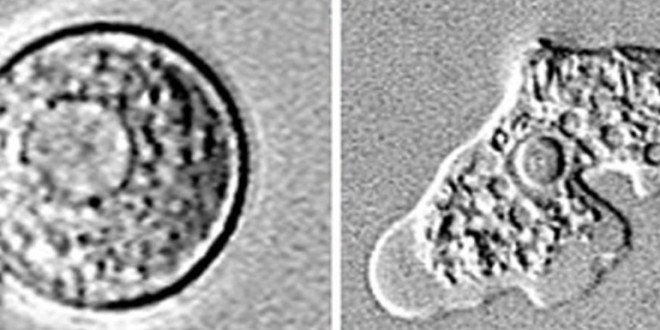A 21-year-old woman from Bishop, California, has reportedly died from a rare but devastating infection caused by a brain-eating amoeba.
Inyo County Public Health officials believe the woman, whose name has not been released, contracted the infection on private property used by only friends and family. Residents in the area are not at risk, officials added.
“The investigation will continue, and all appropriate measures will be taken to involve and inform affected parties of any actions needing to be carried out to minimize any risk to persons in the future,” said Public Health Officer Richard Johnson.
Officials are working with the woman’s family and friends to investigate the source of her infection, Johnson said.
Tests by the Centers for Disease Control and Prevention were positive for Naegleria flowleri, a brain-eating amoeba often found in fresh water and soil. People become infected when contaminated water enters the nose, likely while swimming or diving. The infectious amoeba then travels to the brain and causes primary amebic meningoencephalitis, which is fatal.
The woman woke up from a nap on June 16 with a headache. She felt nauseous and was vomiting.
The symptoms didn’t go away, so she went to Northern Inyo Hospital and was diagnosed with meningitis.
But her health continued to deteriorate, so she was flown to a hospital in Reno, where she suffered a cardiac arrest and died.
“This is a tragic event for someone who becomes infected, as well as their family,” Johnson said. “I feel that it is important for all of us to be informed even though it does not affect lots of people each year.”
Health officials say symptoms start within a few days of exposure to an amoeba. Infected people usually experience headaches, fever, nausea, a stiff neck and vomiting. Hallucinations and seizures occur as the infection advances. Death usually occurs three to seven days after the symptoms start.
Amoeba thrive when temperatures are high and water levels are low, health officials said.
Over the last 53 years, 133 cases have been reported in the U.S., with only three of the infected surviving. Most cases happened in Florida and Texas. Only seven cases have been reported in California.
“I want to emphasize that there have been no evident cases of amoeba contamination in the U.S. in well-maintained, properly treated swimming pools or hot springs,” Johnson said. Appropriate regular filtration and chlorination or other types of disinfecting of water should eliminate the risk, he said.
Agencies/Canadajournal
 Canada Journal – News of the World Articles and videos to bring you the biggest Canadian news stories from across the country every day
Canada Journal – News of the World Articles and videos to bring you the biggest Canadian news stories from across the country every day



